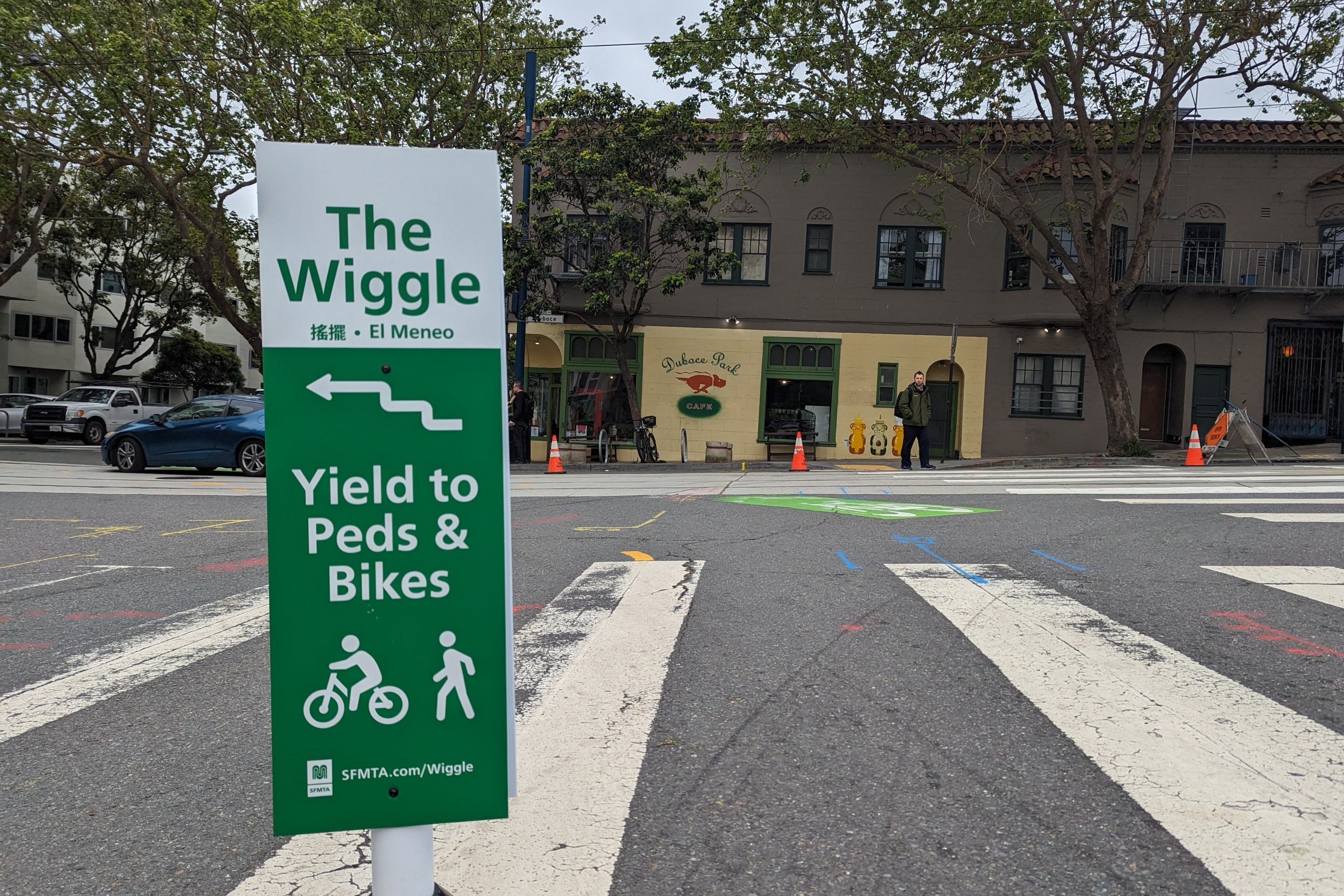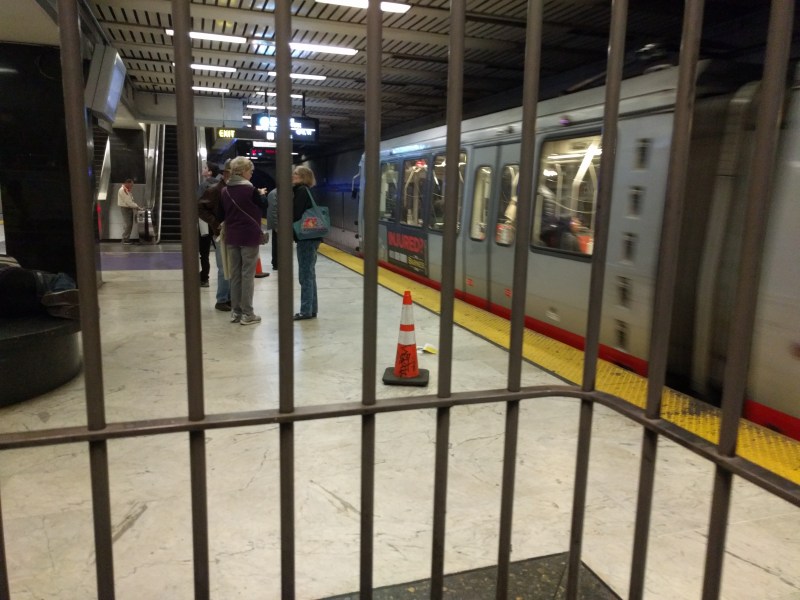Judge Expected to Issue Decision Monday in AC Transit Labor Dispute
4:58 PM PDT on July 30, 2010
 Photo: Susan Decker
Photo: Susan DeckerLawyers for AC Transit and the Amalgamated Transit Union squared off in an Oakland courtroom today in the ongoing dispute over a new contract. After two hours of arguments, Superior Court Judge Judith D. Ford indicated she would issue a ruling as early as Monday, but AC Transit attorneys predicted a final agreement might take much longer, and the legal ordeal could potentially drag into early next year.
At issue was the union's request for an injunction to prevent AC Transit from enacting new employment rules while a new contract is under arbitration. Although the union rejected what AC Transit called its best and final offer, AC Transit's Board of Directors went ahead and implemented the offer's terms earlier this month.
Amalgamated Transit Union officials are seeking to restore the terms of the old contract, saying legal precedent prohibits a "unilateral imposition of conditions of employment." AC Transit lawyer Raymond Lynch disagreed, claiming that precedent, Amalgamated Transit Union International v. Donovan, does not apply since it concerned a more extensive change to work rules.
The dispute has caused a significant disruption for the agency's 236,000 riders. Changes to routes and assignments have left passengers and drivers scrambling to stay up-to-date, and AC Transit claims drivers are exacerbating the situation by staging an unauthorized sick-out.
The district has warned that it is considering cutting weekend service altogether as a cost-saving measure, but it will continue this weekend, according to AC Transit spokesperson Clarence Johnson.
"We will continue on with business as it has been for the past week. Hopefully for our riders it’ll mean that they will get service. They may have to show a little more patience but because if the kind of labor strike we’ve had this week and the previous weekend some of the buses might not show up on time," he said.
In court, AC Transit's arguments hinged on the claim that the union is not irreparably harmed by the new work orders, and that an injunction would cause irreparable harm to the transit agency. Further, Lynch argued, "an employer at an impasse can make changes from an expired arrangement."
Although AC Transit and ATU have entered a period of arbitration, the union objected to the imposition of new terms during that period. "There has to be a law that governs the conduct of parties at impasse," said ATU attorney Beth Ross, describing AC Transit's behavior at times as "a free-for-all," "a vacuum," and "a netherworld."
Lawyers for both sides sparred over which party was suffering the most harm.
"The irreparable harm is that drivers' lives were upended," said ATU attorney Margot Rosenberg, referring to a scheduling overhaul of routes that left some drivers reassigned to routes and times that they were unfamiliar with or not qualified to drive.
"Any alleged harm to the Union has to be balanced against the harm to the district," countered AC Transit's Lynch.
"These members are not going to get their time back," said Rosenberg. But when pressed for specific examples of irreparable harm, she admitted that they haven't found any cases among their members.
Meanwhile, AC Transit spokesperson Sam Singer claimed that drivers are staging a sick-out, citing recent absentee rates that are double the average. But drivers contested that a sick-out was occurring.
"I don't know what numbers they're using," said 10-year veteran James Cornelius. "They haven't shown any proof." He added that the absentee rates were artificially inflated by AC Transit by counting people on family, medical, or military leave.
Adjusting to the route changes have been difficult, Cornelius said. "I don't know where some of these routes go, and I've been here ten years," he said.
AC Transit gave drivers an opportunity to sign up for routes, but the union refused to participate because such a process would fall outside the previous contract. "Nowhere in our contract does it say there's a signup in July," said ATU negotiator Claudia Hanson.
Attorneys for the union argued that an injunction is required under the notoriously complex Section 13(c) of the Urban Mass Transportation Act. Section 13(c) requires that transit agencies offer certain employment protections to employees.
"Section 13(c) prohibits changes until arbitration is completed," said ATU attorney Beth Ross. "It's for the arbitrator to decide what the terms are, not the District."
Lynch defended its imposition of new contract terms, claiming that the cost savings were vital to the agency's continued existence. "We need to do the rescheduling. The harm to us is great. The harm to the union is self-inflicted."
Singer elaborated on the harm that an injunction could cause. "If the judge rules in favor of the Union, the District would lose almost 60 million dollars," he said, potentially forcing the agency to cut weekend service.
ATU's Ross was unsympathetic. "The rules of collective bargaining mandate that the status quo be maintained."
Tension was high in a courtroom that was clearly unprepared for the hearing. With only 24 seats, approximately 40 additional onlookers were forced to stand for two hours in the tiny chamber, packing it like a rush-hour bus. Air conditioning was weak, and the building lost power twice, plunging the windowless room into darkness.
Some union onlookers were pessimistic. "The workers aren't going to win this one," said David Fokes, a retired AC Transit employee. "Public's against 'em."
At the close of Friday's hearing, Judge Ford stated that she hoped to rule on Monday.
"If the District loses on Monday, it will seriously consider an appeal," said Singer. "It would lead this district into significant disaster."
ATU negotiator Claudia Hanson wasn't sure if she'd appeal a loss. "I have not planned for that," she said after the hearing. "We've already won... we're going to arbitration."
Stay in touch
Sign up for our free newsletter
More from Streetsblog San Francisco
Independent Safety Advocates Beef up the Wiggle
Signs and soft-hit posts installed by advocates make the Wiggle bike route calmer and safer for cyclists and pedestrians




